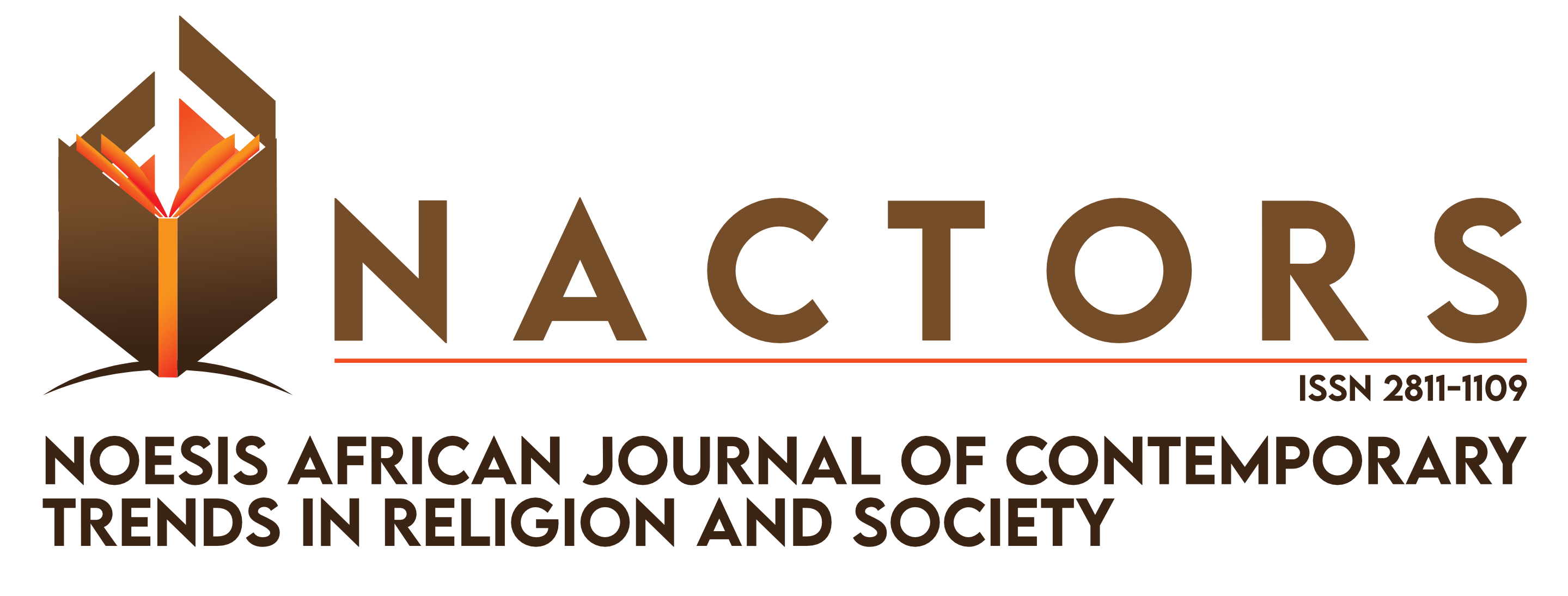Journal Background
NOESIS means results of Perceptions or Brainstorming. This Journal initiative is a collaboration amongst the Departments of Religious Studies in:
- Bowen University, Osun State, Nigeria,
- Kwame Nkrumah University of Science and Technology (KNUST), Kumasi-Ghana and
- University of Georgia, African Studies Institute (UGA-ASI), United States.
Aims and Scope of the Journal
NACTORS is a peer–reviewed open-access academic Journal that serves as a forum for disseminating research findings relating generally to issues on Religion and Society. Its specific purpose is to provide a forum for Religious, Theological and Ecclesiastical discourses as well as emerging interests in the global Theological and Ecumenical dialogue that are of particular relevance to Africa and the Diaspora.
Brief Histories of the Three (3) Collaborating Institutions
- Department of Religious Studies, Bowen University – Nigeria: Bowen University, Iwo, Osun State Nigeria is a private university established under the Nigerian Baptist Convention in 2012. The Department of Religious Studies, College of Liberal Studies offers BA and MA programmes in Religious Studies.
- Department of Religious Studies KNUST, Ghana: The Department of Religious Studies, College of Humanities and Social Sciences started in 2005 with the BA Religious Studies programme. The Department now offers the MA and MPhil and PhD Religious Studies programmes. The various programmes advance knowledge in religions to produce graduates that foster inter-religious dialogue for peaceful co-existence in society and the socio-economic development of Ghana and Africa.
- University of Georgia, African Studies Institute (UGA-ASI): The University of Georgia is a public land-grant research university with its main campus in Athens, Georgia. Founded in 1785, it is one of the oldest public universities in the United States. It is the flagship of the University System of Georgia and has been classified as a Public Ivy. This is because the University, though a public institution offers an academic experience equivalent to an Ivy League University. The African Studies Institute (ASI) has a long tradition of African Studies programming at the University of Georgia. It was established as a program in 1987 and has blossomed into a leading African Studies Institute. ASI’s strongest growth has been in curriculum development and increased opportunities to teach and learn about Africa’s culture, Religion, History and other Subject areas about Africa and its Diaspora.
Editoral Team
Editors
- Prof. Jonathan Edward Tetteh Kuwornu-Adjaottor,
jetkuwornu-adjaottor.cass@knust.edu.gh.
KWAME NKRUMAH UNIVERSITY OF SCIENCE AND TECHNOLOGY, GHANA - Prof. Isaac Deji Ayegboyin,
dejigboyin@gmail.com
BOWEN UNIVERSITY NIGERIA - Prof. Ibigbolade S. Aderibigbe,
iaderibi@uga.edu
UNIVERSITY OF GEORGIA, AFRICAN STUDIES INSTITUTE
Associate and Review Editors
- Ezekiel Ajani,
ajani@bowen.edu.ng - Folarin Lateju,
lateju@bowen.edu.ng - Francis Appiah Kubi –
fappiah-kubi.cass@knust.edu.gh - John Opoku,
cass@knust.edu.gh - Victor Selorme Gedzi,
cass@knust.edu.gh - David Olali
Editorial Board
- Ingie Hovland of University of Georgia, USA
- Olutola Akindipe of Salem College, USA
- Simeon Ilesanmi of Wake Forest University
- Eric Nii Anum of University of Cape Coast
- Daniel Bediako of Valley View University
- Emmanuel Asante of Kwame Nkrumah University of Science and Technology
- John Opoku of Kwame Nkrumah University of Science and Technology
- George Ossom-Batsa of University of Ghana
- Kwabena Asamoah-Gyadu of Trinity Theological Seminary, Ghana
Publication
The Journal would be published online twice annually (May and November). All articles would be made available for download online. However, printed copies would be made available for institutions and authors upon request at a cost.
Paper Specifications
For all abstracts accepted, the papers to be submitted should follow the following specifications:
Font Type and Size: Times New Roman, 12 font size
Number of Words: 5,000 – 6,000 Words
Documentation Style- Turabian (Footnote style)
- Due dates would be communicated in the acceptance letter
